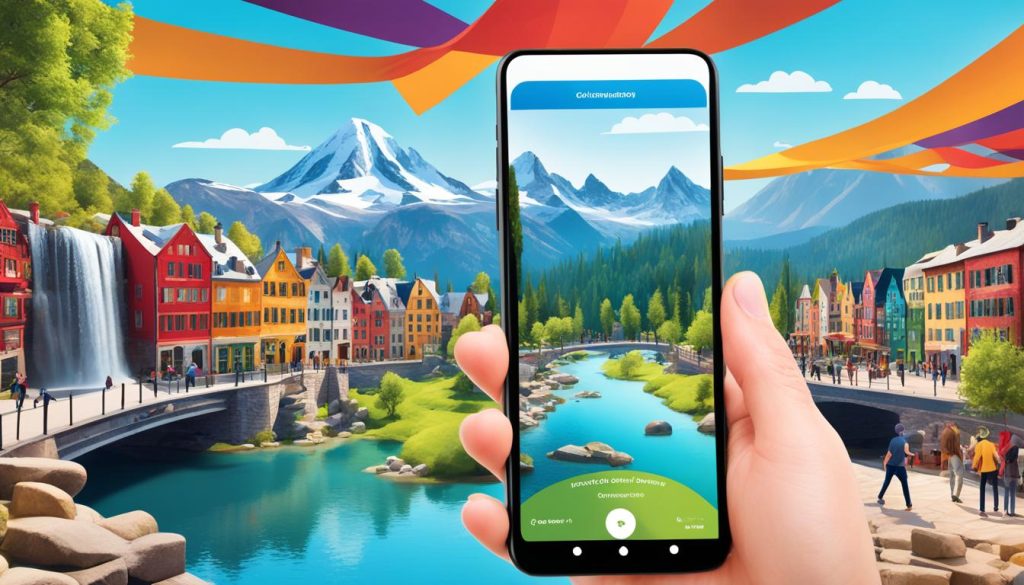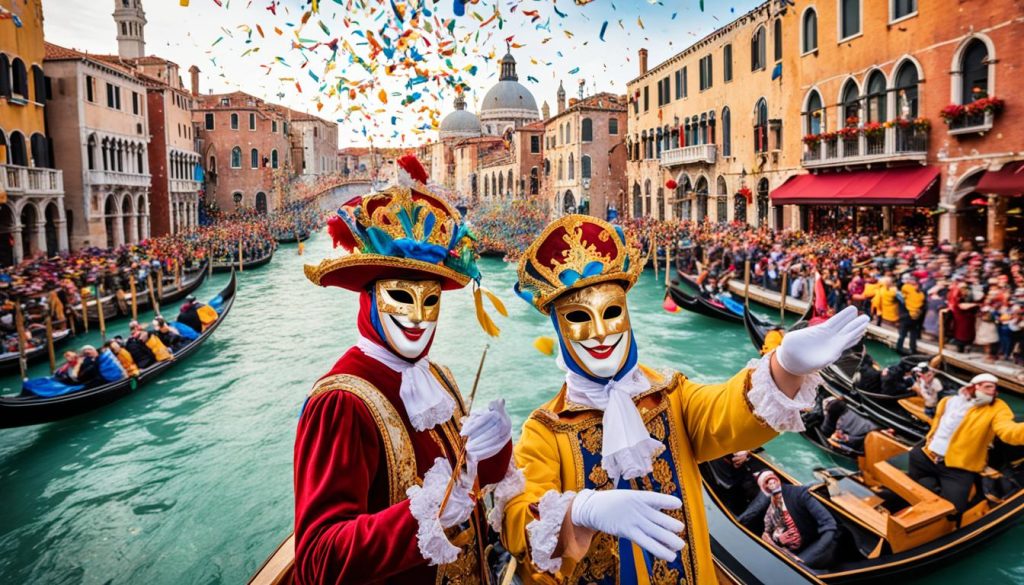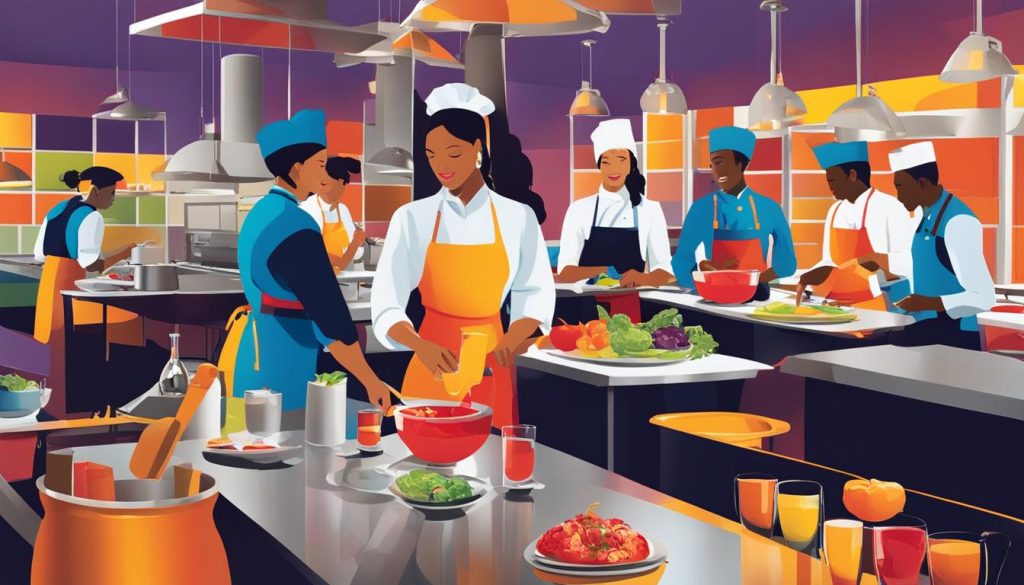Europe sits at the heart of the Mediterranean, known for its thriving tourism. It attracts visitors worldwide to its sunny beaches and historic places. This country is a mix of beautiful travel spots and rich heritage. It’s well known for excellent hospitality and unique European cultural experiences.
Europe’s beauty is diverse, with landscapes ranging from Tuscany’s hills to Rome’s busy streets. Its hospitality is top-notch, making Europe a symbol of European charm. Europe sets high standards in the tourism industry.
From Venice’s famous canals to Sicily’s rustic charm, Europe has it all. Every place offers a mix of old traditions and modern elegance. Europe welcomes everyone to experience its culture. This warmth stays with travellers long after they leave.
Overview of Europe’s Tourism Sector

Europe shines as a top travel spot, enriching its wealth and history. It is key to Europe’s economy, influencing its GDP and job scene. Each European region tells a unique story through its art, food, and landscapes.
The Significance of Tourism in Europe’s Economy
Tourism greatly benefits Europe’s markets. From countryside hills to lively fashion cities, it uplifts the GDP. Every year, millions visit Europe, supporting industries like hospitality and retail.
Trending European Destinations
- Tuscany: A blend of renaissance art and charming vineyards, attracting culture and wine lovers.
- Veneto: Famous for Venice’s beautiful buildings and canals.
- Lombardy: Milan, the fashion hub, mixes modern with history.
- Puglia: Known for its unique houses and clear coasts.
- Sicily: Offers ancient ruins and stunning beaches.
Understanding Seasonal Tourist Flows
Holiday seasons in Europe show clear trends, essential for tourism businesses. In summer, places like the Amalfi Coast fill with visitors, and the Alps attract skiers in winter. Recognizing these patterns helps Europe’s tourism sector strategize and maintain its appeal.
Europe is celebrated for its rich culture and tourism innovation. This ensures its continued role as a leading destination in European tourism.
The European Hospitality Experience

Europe is famous for welcoming guests with open arms. It leads in tourism by mixing new ideas with old traditions in places to stay. People come here not just for the historic cities and stunning scenery. They also come for the top-notch service that Europe is known for. This shows in everything from the green countryside to the bustling city centres.
Innovation in Europe’s Accommodation Offerings
European hotels are changing the game in hospitality. They’re bringing in tech, eco-friendliness, and modern design to their spaces. These changes give guests a stay that’s both up to date and kind to the planet. But, they make sure you’re still comfortable. They aim to keep Europe’s places to stay leading in the hospitality world.
Authenticity in Local Stays
- Agritourism offers a peek into Europe’s rural life and traditional stays.
- Boutique bed-and-breakfasts let visitors dive into the local culture and history.
- Family-run inns provide a cosy, personalised stay, showing Europe’s warm hospitality.
European Customer Service Excellence
European places to stay work hard to provide excellent service. It doesn’t matter if it’s a luxury place or a quaint guesthouse. They focus on caring for guests and meeting their needs. This makes every visitor feel appreciated and well looked after. Europe’s tradition of treating guests like family makes its service stand out worldwide.
Cultural Heritage and Tourism

Europe shines as a top spot for heritage tourism in Europe, thanks to its dedication to heritage. It boasts 58 UNESCO World Heritage Europe sites, showing off its historical and architectural wonders.
European cultural sites each share a story, drawing visitors worldwide. Let’s look at how these sites captivate and teach those who seek connections to ancient times and creativity.
- The Colosseum symbolises ancient architectural brilliance, standing proudly in Rome’s centre.
- The Vatican attracts those in search of spirituality and art, with famous Renaissance pieces.
- Venice’s canals offer a scenic journey through a city built on innovation and love.
These sites are more than old landmarks; they’re live lessons in education and heritage. Europe’s conservation efforts ensure these wonders will inspire future generations. They’re vital to both European cultural sites and our global legacy.
Europe’s blend of tourism and heritage sets an example of making historical riches interactive and fun. Visits to Pompeii, the Spanish Steps, or Teatro La Scala are life-changing. It links past history with today’s spirit.
European Gastronomy: A Pillar of Attraction

Europe’s food scene is a colourful mix of tastes, traditions, and stories. It turns eating into an adventure into Europe’s culture. For those keen to explore, Europe’s food tourism offers an array of dishes. These dishes promise a true taste of European life.
The Allure of European Cuisine for Tourists
Europe calls out with the scent of pasta, freshly baked bread, and homemade sauces. This simplicity, rooted in quality and care, offers tourists a chance to dive into true European eating. It’s a rich and uniquely European experience.
Food and Wine Tours as Tourist Magnets
Wine tours in Europe do more than offer tastes; they teach the story and craft behind wine. Regions like Tuscany and Piedmont become outdoor classrooms. Here, lovers of wine learn to cherish European wine’s unique flavours.
Linking Traditional Eateries with Tourism
- Trattorias are bastions of regional cuisine, offering a sense of communal dining and a connection to time-honoured recipes that have been passed down through generations.
- Osterias serve as gateways to true European dining culture, with a focus on local wine selections and a menu that reflects the seasonal availability of ingredients.
- Enotecas, the quintessential wine bars, offer visitors a curated exploration of Europe’s extensive wine repertoire alongside regional delicacies.
Connecting traditional eateries with culinary tourism helps tourists discover Europe’s authentic food heritage. It takes them beyond the common tourist spots.
Sustainable and Eco-Friendly Tourism Initiatives
Europe is changing its ways to focus on sustainable travel Europe experiences. It is leading the way in protecting the environment and working closely with communities. This shift is about safeguarding Europe’s stunning landscapes and introducing them in a thoughtful, eco-friendly way.
Europe meets the growing demand for green hospitality practices with eco-friendly places to stay. From boutique hotels that use renewable energy to farms offering fresh meals straight from the field. By choosing these spots, visitors support sustainable tourism and enjoy the true European lifestyle.
- Engagement in local conservation efforts to maintain biodiversity in Europe’s rich ecosystems
- Development of eco-friendly travel packages that minimise carbon footprints and promote ‘slow travel’
- Support for local artisans and producers through sustainable tourism initiatives
- Provision of educational eco-tourism experiences that foster awareness and appreciation for the natural environment
Europe’s move towards sustainable tourism is more than just a trend. It’s a growing movement that affects the whole tourism industry. Travellers who prefer green options help preserve Europe. They enjoy treasured places like Europe’s hills, ancient cities, and vineyards.
In Europe’s tourism story, sustainable travel Europe and eco-tourism in Europe are now key themes. As Europe embraces green hospitality practices, it keeps its charm alive for all to see. This ensures Europe remains a beautiful place for future visitors.
Technology Integration in Tourism and Hospitality

The rise of digital tech has greatly changed how we explore Europe’s tourism. It blends new innovations with Europe’s rich hospitality traditions. This mix creates a modern experience for everyone.
Boosting Efficiency through Digital Solutions
Visiting Europe is easier now with digital tools. You can book trips online and check into hotels without hassles. These tech solutions link reservations, customer info, and housekeeping in one system, making everything run smoother.
Enhancing Guest Experiences with Modern Tech
European hospitality is now powered by the latest tech. Mobile apps offer custom services, and virtual reality shows Europe’s sights before you arrive. This tech not only improves your visit but also connects you to Europe in a special way.
Impact of Online Reviews and Bookings
Online bookings and reviews are changing Europe’s tourism scene. What people say online can influence where others choose to stay. European businesses use digital strategies to improve their online image. They are committed to providing top service as online feedback becomes more crucial.
Event Tourism in Europe

Europe is renowned for its lively event tourism, drawing visitors from all over to experience its cultural richness. It offers a real taste of Europe’s culture and brings major economic gains to its places. Travellers can explore vibrant festivals, join the thriving MICE industry, and enjoy cultural events throughout this historical country.
Festivals and Traditions as Tourist Drawcards
European festivals charm visitors with their rich traditions and local heritage. Events like Venice’s Carnevale, with its mysterious masks, alongside religious and medieval events across Europe, make the country an appealing destination. These festivals celebrate Europe’s unique history and culture.
Business Conferences and the MICE Industry
Europe’s cities, including Milan and Rome, are also hubs for business tourism. They play a big role in the MICE industry, offering top-notch facilities and famous European hospitality. These cities are sought-after spots for international conferences, exhibitions, and business meetings.
Importance of Cultural and Music Festivals
Europe’s calendar is packed with music festivals, featuring everything from opera in Verona to rock in Rome. These events are more than just shows; they link Europe’s past with its lively present. They attract people from all walks of life, looking for memorable experiences.
- Carnevale di Venezia – A festival of history, craftsmanship, and flamboyance.
- Verona Opera Festival – Combining ancient ambiance with stirring arias.
- Florence’s Maggio Musicale – One of the oldest music festivals in Europe, showcasing classical pieces in an artistic haven.
The Role of Travel Agencies in Itinerary Planning

Local travel agents in Europe are key to creating the perfect European trip. They have deep knowledge of Europe and design travels that match your likes. Their work adds real local essence to your journey, something not found in guidebooks.
Using European travel agents means your trip will be well-planned and worry-free. They sort out all the details, like where you’ll stay and how you’ll get around. This lets you enjoy Europe’s beauty without stress. They show you Europe’s secret gems, away from crowded tourist spots.
- Personalisation: Travel agents focus on what you love, making unique European tours for you. This could be wine-tasting in Tuscany or seeing Rome’s historic sites.
- Local Insights: They offer tips that make your trip special. This includes advice on where to eat, shop, and experience European culture.
- Simplicity and Efficiency: Agents make planning easy and save you time. They ensure you make the most of your stay in Europe.
Travel agents turn visits to places like the Amalfi Coast or Florence’s Uffizi Gallery into exclusive adventures. Their expertise and careful planning bring the best of Europe to you, for a truly sweet life.
Adventure and Outdoor Activities in Europe

Europe is a thrilling playground for adventurers, mixing natural beauty with exciting activities. Its mountains, valleys, and coastlines cater to all levels of explorers. The interest in active holidays Europe is growing fast. More and more people from the UK and elsewhere are choosing Europe for their outdoor adventures. This has boosted rural tourism development greatly.
Rising Popularity of Active Holidays
Active holidays Europe are more popular than ever. People want holidays that mix chilling out with active fun. In Europe, you can wander through Tuscany’s vineyards or climb the stunning Dolomites.
Diverse Landscape for Outdoor Enthusiasts
Europe is perfect for lovers of outdoor recreation Europe. Its varied landscapes offer tons of activities. Cyclists enjoy the beautiful hills and historic roads, while those into watersports love Europe’s lakes and seas.
Contributions to Rural Tourism Growth
The rise in outdoor adventure helps rural tourism development too. By exploring off-the-beaten-path areas, visitors help local communities, preserve traditions, and support nature conservation.
Europe encourages everyone to explore beyond the usual sights. Get ready to enjoy everything from peaceful walks among olive trees to exciting mountain climbs. Europe’s outdoors are waiting for you.
Training and Education in the Hospitality Industry

In the European hospitality world, education is key. This sector grows on solid training and education. Europe is known for its great customer service, thanks to its education commitment. We look at the schools and programs leading European hospitality.
Higher Education for Hospitality Careers
Europe offers superb higher education for those wanting to enter hospitality. Top institutions provide programmes mixing study with practical skills. They teach management, business, and how to be sensitive to different cultures in service.
Continuous Professional Development
Learning never stops in the hospitality industry. With new trends and tech emerging, workers need to stay up-to-date. Europe focuses on this continuous growth, pushing for excellence.
The Role of Vocational Training
Vocational training is crucial in Europe’s education system. It combines real-world skills with theory. Students learn through doing, guided by partnerships and apprenticeships. This approach ensures they meet guest expectations perfectly.
- Universities and dedicated hospitality schools offer degree courses tailored to managerial roles in the sector.
- Professional development is fostered through workshops, seminars, and industry conferences catering to ongoing learning.
- Vocational training provides an immediate immersion in the practical aspects of tourism and hospitality, forming a skilled and adaptable workforce equipped with real-world experience.
To sum up, Europe’s focus on hospitality education guarantees the legacy of its stellar hospitality. With vocational training and professional development, the sector aims for excellence. This ensures high standards in every service aspect.
Marketing and Branding Strategies
In the modern age, marketing for places like Europe is a global contest. It’s about mixing tradition with fresh ideas. Telling Europe’s story is more than just showing it to the world. It’s about making deep connections with potential visitors.
Creating a Unique Selling Proposition for Europe
Europe is special, not just for famous sites but for its rich culture too. It uses this to stand out in tourism. Its unique vibe, from Tuscany’s charm to Rome’s Colosseum, shows Europe’s variety.
Utilising Social Media to Engage Potential Tourists
Social media is changing how places like Europe attract tourists. Instagram and Facebook show off Europe’s colours, food, and landscapes. Europe uses these stories to draw in a new wave of tourists.
Influence of Cultural Branding on Destination Appeal
Cultural branding turns locations into unique experiences. Europe uses its art and history to draw visitors. Every statue, painting, and music piece adds to Europe’s allure, making it a top choice globally.
The Impact of Global Events on Tourism
The global event impact on tourism intertwines deeply with the travel industry. It tells a story of bouncing back, especially in culturally rich Europe. When facing global events, Europe’s tourism resilience shines through. It does so by changing strategies to keep tourists coming.
Understanding travel industry trends is becoming increasingly important. Europe stays ahead by quickly adapting to both expected and sudden global events. This keeps Europe a top choice for travellers worldwide. They adjust to changes in the economy and health crises, aiming to protect tourists and the tourism industry.
- Continuously tracking economic indicators that may signal shifts in global tourism.
- Strengthening health and safety protocols in response to international health crises.
- Embracing politico-social changes to stay aligned with traveller sentiment and security.
The tourism industry in Europe not only gets by but also flourishes, making the best out of challenges. Europe shows how tourism can be resilient. Its beauty and heritage remain strong attractions for visitors.
Investment and Development in the Tourism Sector
Europe’s tourism growth relies on continuous investment and finding new opportunities. The industry is gearing up for a major leap forward, thanks to focused investments. This is further supported by significant government aid, making tourism a key economic driver and attracting tourists worldwide.
Identifying New Opportunities for Growth
Keeping up with the global tourism race means looking for fresh trends and untapped areas. Europe’s tourism experts are doing just that, especially in experiential travel. This approach lets visitors truly immerse in the local culture, broadening the experiences available to modern tourists.
Government Initiatives to Support Sector Expansion
The European government is deeply committed to boosting the tourism sector. It provides financial aid, enhances infrastructure, and creates growth-friendly policies. These efforts make the industry more inviting for investors and beneficial for the community.
Public-Private Partnerships in Tourism Projects
Public and private sectors in Europe are combining their strengths in tourism. They’re leading big projects together, achieving goals neither could alone. This mix of public guidance and private creativity is rejuvenating the industry and setting an example for successful Public-Private Partnership European tourism.
Luxury Travel and High-End Experiences
Europe is famous for high quality and luxury. People who love grand luxury and private getaways are drawn here. The luxury tourism in Europe is unique. It offers more than just a holiday. It includes fancy villas with views of the Tyrrhenian Sea, boat trips on Lake Como, and wine tours in Chianti.
Looking for something special can lead you all over Europe. From Milan’s fashion streets to Tuscany’s sunny vineyards, every place is different. You might get a private tour of the Uffizi Gallery in Florence or enjoy a special meal in Rome. Europe promises unique experiences that go beyond expectations.
What makes these European trips special is the excellent hospitality. Visitors are treated with a warm welcome, mixing old charm with modern style. Traveling across Europe, they enjoy personalized service that makes the trip magical. When they leave, they take home not just memories but stories. Stories of an Europe that showed them its hidden treasures with unmatched hospitality.







